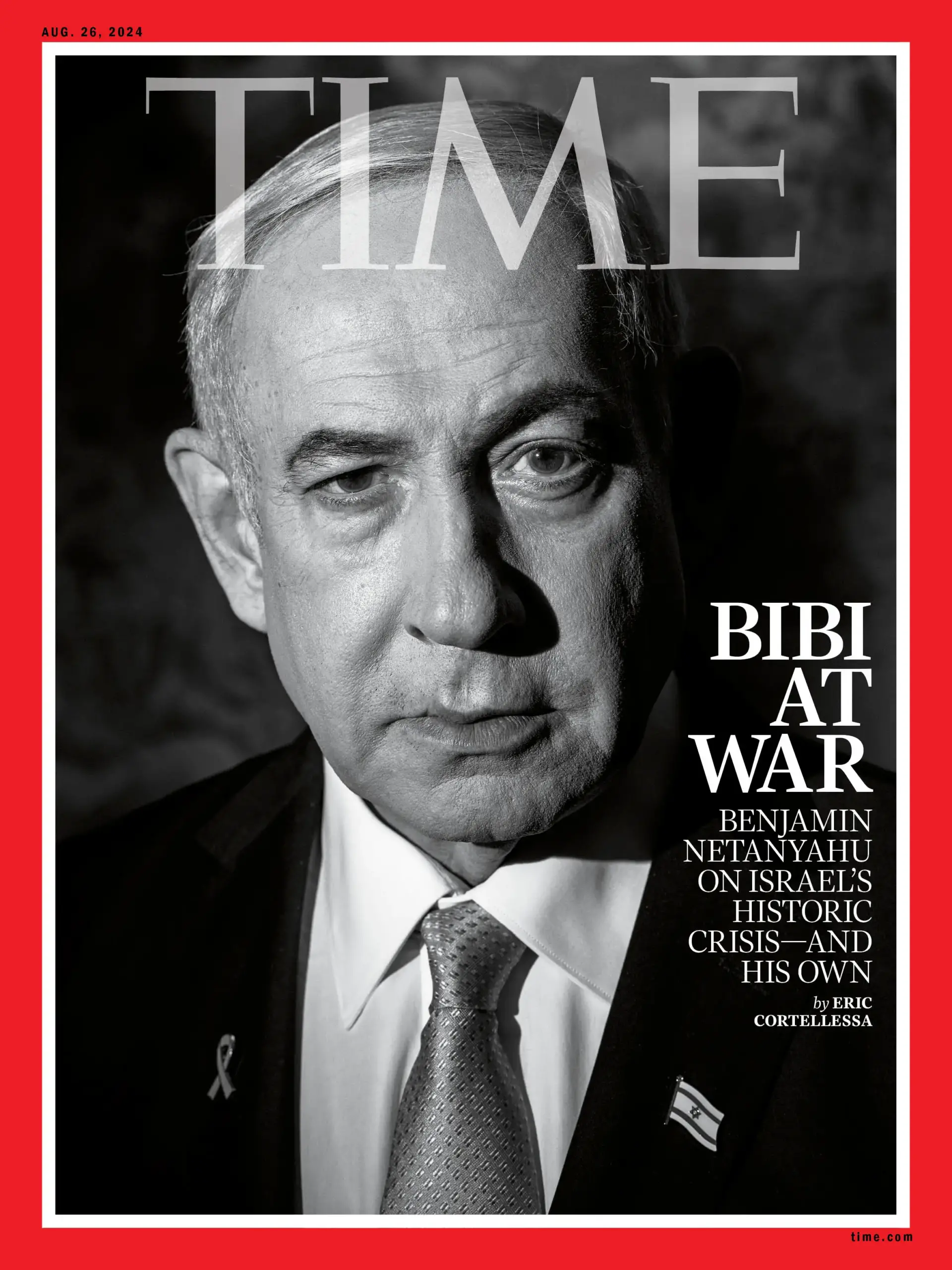In an exclusive interview with TIME, Israel’s Prime Minister Benjamin Netanyahu explains how he sees the Gaza war and mounting regional threats.
For the cover story, TIME’s Eric Cortellessa—who interviewed Netanyahu for 66 minutes in his Kaplan Street offices on August 4, 2024—writes: “Through a combination of electoral vicissitudes, sweeping regional changes, and his own political gifts, his almost 17-year cumulative tenure is longer than that of anyone else who has led Israel, a country only two years older than he is. Over that span, Netanyahu’s political endurance has been built around one consistent argument: that he’s the only leader who can ensure Israel’s safety.”
Cortellessa continues: “But in the wake of the worst slaughter of Jews since the Holocaust, with more than 40,000 Gazans dead in the ensuing conflict, Israel under Netanyahu is not blessed with peace but besieged by war. As we speak, the country is on edge for an expected aerial attack from Iran, the second in four months…The fighting is ongoing in Gaza, with more than 100 hostages still held by Hamas. Much to the frustration of the Biden Administration, Netanyahu still has not articulated a credible plan to end the war or a vision for how the Israelis and the Palestinians can peacefully coexist.”
– Credit: Photograph by Paolo Pellegrin—Magnum Photos for TIME
– Read the full cover story: here
– Read the full transcript of TIME’s interview with Benjamin Netanyahu: here
HIGHLIGHTS FROM TIME’S EXCLUSIVE INTERVIEW WITH BENJAMIN NETANYAHU:
On whether he would make an apology for the Oct. 7 attack on Israel, Benjamin Netanyahu tells TIME: “Apologize?…Of course, of course. I am sorry, deeply, that something like this happened. And you always look back and you say, Could we have done things that would have prevented it?”
On how he’s bracing for escalating conflict on even more fronts: “We’re facing not merely Hamas…We’re facing a full-fledged Iranian axis, and we understand that we have to organize ourselves for broader defense.”
On how his approval of Qatari cash infusions was humanitarian: “We wanted to make sure that Gaza has a functioning civilian administration to avoid humanitarian collapse.”
On how he claims the money didn’t form the basis of Hamas’ eventual threat to Israel and his primary mistake, he says, was acceding to his security committee’s reluctance to wage full-on war: “The main issue was the transfer of weapons and ammunition from the Sinai into Gaza…Oct. 7 showed that those who said that Hamas was deterred were wrong…If anything, I didn’t challenge enough the assumption that was common to all the security agencies.”
On how a visit intended to showcase solidarity with Israel’s most essential ally instead deepened what was for Israel a growing and dangerous partisan divide: “I don’t think that the much reported erosion of support among some quarters of the American public is related to Israel…It’s more related to America.”
On how once Hamas is out of power, he wants to recruit Arab countries to help install a civilian Palestinian governing entity that wouldn’t pose a threat to Israel: “I’d like to see a civilian administration run by Gazans, perhaps with the support of regional partners…Demilitarization by Israel, civilian administration by Gaza.”
On how his vision of allowing only limited pockets of autonomy in Palestinian areas where Israel maintains overriding security control: “That’s a detraction of sovereign powers…There’s no question about it…I agree we should maintain a Jewish majority, but I think we should do it in democratic means…That’s why I don’t want to incorporate the Palestinians in Judea and Samaria as citizens of Israel [referring to the biblical name of the West Bank] It means that they should run their own lives. They should vote for their own institutions. They should have their own self-governance. But they should not have the power to threaten us.”
On Zionism surviving the war: “It will, if we win…And if we don’t, our future will be in great jeopardy.”
On whether he intends to remain Prime Minister: “I will stay in office as long as I believe I can help lead Israel to a future of security, enduring security and prosperity.”
On whether he would say an opposition leader who presided over Israel’s worst security failure should stay in power: “It depends what they do…What do they do? Are they capable of leading the country in war? Can they lead it to victory? Can they assure that the postwar situation will be one of peace and security? If the answer is yes, they should stay in power. In any case…that’s the decision of the people.”
The cover story also features conversations with Israeli officials, including former Israeli Prime Minister Ehud Barak who tells TIME:
On how Netanyahu is in his psychological elements: “He genuinely believes that he’s saving Israel…Not that he’s responsible for one of the worst events in its history.”
On the claim that Netanyahu is drawing out the Gaza campaign for personal political reasons: “Netanyahu is focused on his longevity in power more than the interests of the Israeli people or the State of Israel…It will take half a generation to repair the damage that Netanyahu has caused in the last year.”
On Netanyahu deepening divisions between Palestinians in the West Bank and Gaza: “He saw Hamas as an asset and the [West Bank–based] Palestinian Authority as a liability…As long as he can hold Hamas alive and kicking and being a threat to Israel, he can easily protect himself against demands from America and from the rest of the world who argued that Israel should look for a way to achieve a breakthrough with the Palestinians.”








